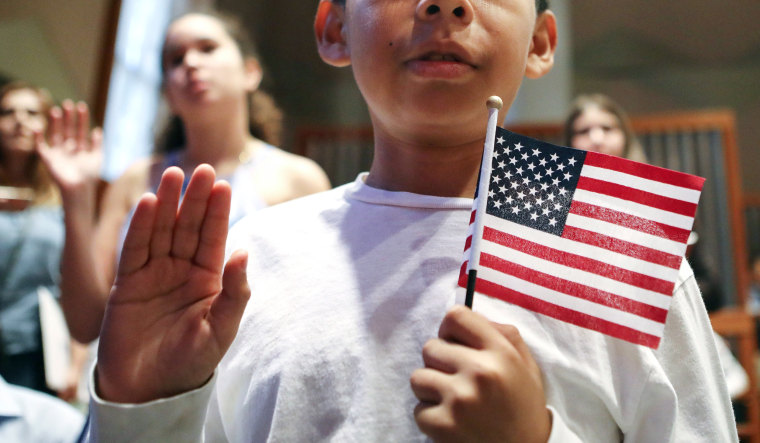In between considering a batch of pardons for convicted war criminals and stonewalling a congressional investigation into his own alleged crimes, President Donald Trump last week deigned to lecture immigrants about “personal responsibility,” reminding communities of their duty to be self-sufficient. He announced that he would hold family members of immigrants accountable for whatever social welfare benefits are used by those they sponsor to come to the United States.
But billing immigrant sponsors for their loved ones’ welfare costs is not about responsibility, it’s about assaulting the bonds of family and community at the heart of a democratic society.
The White House memorandum resurrects an obscure and rarely enforced provision of a Clinton-era welfare reform law that mandates the sponsors of new immigrants — primarily citizens who are supporting immigrant family members seeking to resettle in the U.S. — to compensate Uncle Sam for any need-based federal aid that the immigrants receive, such as Medicaid. Though the administration has not spelled out how various agencies running public assistance programs will actually calculate the costs or compel individuals to repay their “debts,” the subtext is clear: The administration wants to prioritize what little is left of the threadbare federal safety net for white, native-born citizens.
The memorandum further illustrates Trump's overarching immigration agenda — a business-friendly program that aims to prioritize “merit-based” immigration, based on skills and education, rather than family reunification, which has historically driven the growth of immigrant communities.
The memorandum is, more broadly, the latest in a string of Trumpian schemes to exclude immigrants from public services and civic life. Earlier this month, the administration moved to kick immigrants out of federally subsidized housing through a ban on undocumented immigrants — even those living with legal-resident family members — who are currently able to live in mixed-status households. The proposed rule would lead to the eviction of an estimated 55,000 children who are either citizens or green card holders. Ben Carson, secretary of the Department of Housing and Urban Development, claimed the policy aims to preserve “our scarce public resources” for legal residents.
But the assumption that government-supported housing is too “scarce” to share with immigrants blatantly ignores the fact that many citizens are deeply embedded in mixed-status households that form the lifeblood of multicultural communities. Driving immigrants into homelessness won’t alleviate the shortage of affordable housing, but it would aggravate the terror already haunting poor immigrant families under Trump.
The threat of eviction deepens the panic that the administration triggered with an ongoing campaign to penalize immigrants for using social welfare. Last fall, a proposed rule change sought to tighten the criteria for deeming immigrants likely to become a “public charge” — or at risk of becoming primarily dependent on public assistance — when immigrants apply for admission to the U.S. or for a green card. Immigration authorities could, under the new policy, evaluate immigrants by judging their estimated need for cash assistance, potential for dependence on long-term institutional care under Medicaid or even their mental health status or English proficiency. It’s yet another signal that the administration seeks to penalize immigrants for using government assistance even when they are fully entitled to it.
Although the public-charge rule has not yet been implemented, according to the Urban Institute, surveys already show a major chilling effect: Last year, about one in seven adults in immigrant families avoided using a noncash form of public assistance, like food stamps — including one-fifth of low income immigrants. Reflecting the racialized nature of Trump’s border crackdown, Latinx adults in immigrant families were twice as likely as other racial groups to report being deterred from benefits programs. Many immigrants have apparently determined that it’s safer to expose themselves to illness or hunger than to risk running into trouble with immigration authorities.
So the impact could be even more devastating if the proposed rule actually goes into effect. According to the Migration Policy Institute, out of an estimated 27 million immigrants and family members who would potentially be affected, “5.4 million to 16.2 million ... could be expected to disenroll from programs.” Both citizen and noncitizen children would potentially lose access to health care, food stamps and other benefits, because “their families deem the potential immigration consequences of continued access to be too great."
Trump’s war on immigrants is expanding to target people who support immigrants as well. Under former Attorney General Jeff Sessions, the administration launched an unprecedented assault on so-called “sanctuary cities,” by threatening to cut off federal funds for the growing network of municipalities that have pledged to refuse to cooperate with federal immigration enforcement efforts. City leaders have managed to thwart the administration's move, but unilateral federal crackdowns on immigrants continue in cities regardless of local backlash.
An even cruder attack on allies of immigrants was the prosecution of four volunteers who tried to aid migrants at the southwest Arizona border. The humanitarian workers, members of the group No More Deaths, were convicted last January after getting “caught” placing jugs of water in a protected desert area for migrants making the deadly journey.
Trump’s anti-immigrant decrees effectively weaponize the politics of exclusion, by imposing shame and stigma on immigrants just for seeking support from a public agency or relying on it for the care of a loved one. And the administration's efforts to wield the law to attack the loved ones of migrants — to impose debts on their family members, to criminalize even the smallest act of charity — all play into a crusade to shift the border ever inward, seeking to divide communities and further alienate the undocumented. But the relatives, neighbors and allies of immigrants will never stop supporting their loved ones, with or without papers. Trump has only raised the price of defending the unbreakable bonds of family, across communities and beyond borders.




